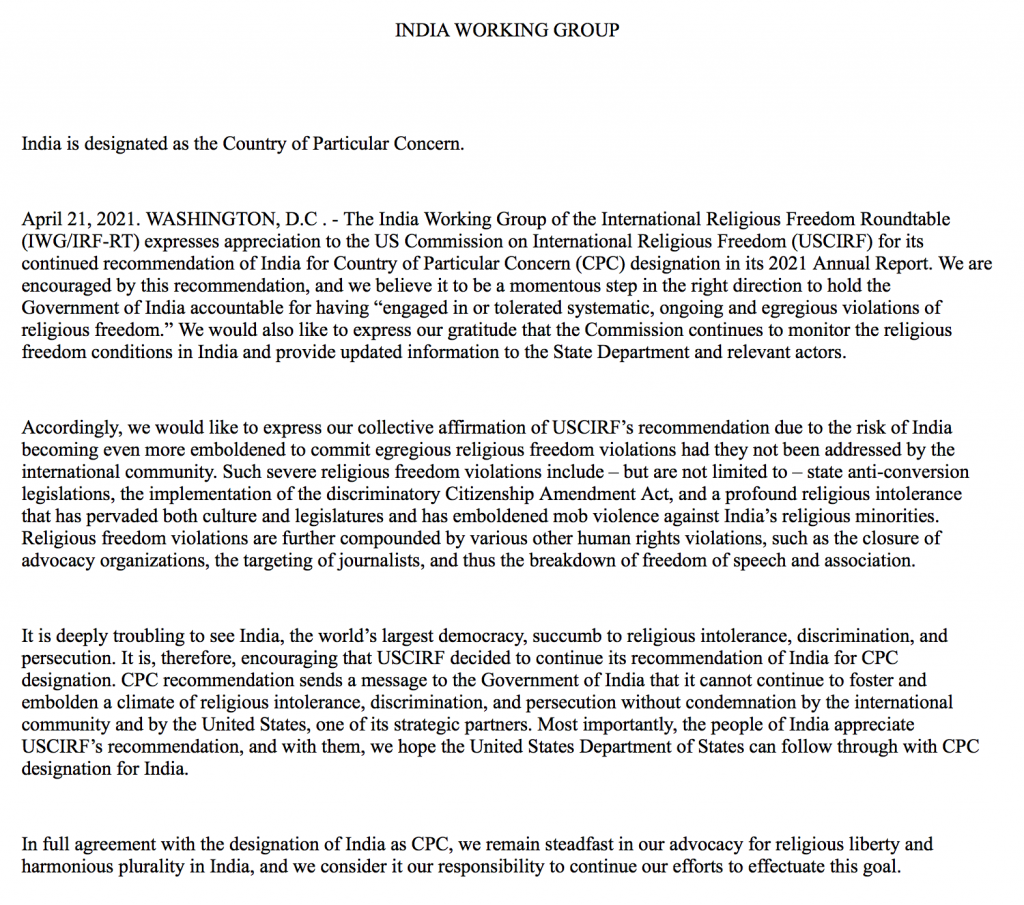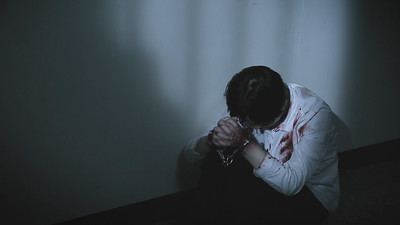On 21 April 2021, the United States Commission on International Religious Freedom released its Annual Report 2021, in which they compile a list of countries recommended for 'CPC' status by the United States Department of State. 'CPC's, or 'Countries of Particular Concern', are countries whose governments have "engaged in or tolerated systematic, ongoing and egregious violations of religious freedom.'
Among the list of countries USCIRF recommended for CPC status are Burma, China, Eritrea, India, Iran, Nigeria, North Korea, Pakistan, Russia, Saudi Arabia, Syria, Tajikistan, Turkmenistan, and Vietnam. Those that USCIRF recommended to be placed on the State Department’s Special Watch List (SWL) include Afghanistan, Algeria, Azerbaijan, Cuba, Egypt, Indonesia, Iraq, Kazakhstan, Malaysia, Nicaragua, Turkey, and Uzbekistan. USCIRF removed Bahrain, Central African Republic, and Sudan from the SWL recommendations. SWL countries are those that are “deemed not to meet all of the CPC criteria but engages in or tolerates severe violations of religious freedom.”
See below key developments for countries that Jubilee Campaign has focused on in our work and that have been recommended by USCIRF for CPC designation:
Burma – In February 2021, the military of Myanmar, referred to as the Tatmadaw, instigated a coup to overthrow the democratically-elected State Counsellor of Myanmar, Aung San Suu Kyi. Following the coup, military forces increased their human rights atrocities – violence, extrajudicial killings, rapes – against religious minority groups, including Christians and Rohingya Muslims. Thousands of Burmese civilians, including those previously mentioned persecuted communities, have fled to neighboring countries to seek safety.
China – Multiple reports, such as those by German researcher Adrian Zenz and the Australian Strategic Policy Institute, further exposed the Chinese government’s human rights violations against Uyghur and Turkic minorities, including mass detention, political indoctrination, religious ‘unlearning’, sexual violence, physical and mental torture, sterilization and coercive birth control. At the same time, thousands of Falun Gong practitioners and prisoners of conscience have been arrested throughout 2020 and likely subjected to forced organ harvesting. Numerous Catholic and Christian pastors and priests were arbitrarily detained.
Eritrea – In a step to mitigate the potential spread of COVID-19 among detained populations, Eritrean authorities released thousands of prisoners, 240 of which were religious prisoners of conscience (RPoCs). At the same time that some RPoCs were released, however, others were detained, and 93-year-old Patriarch Abune Antonios, leader of the Eritrean Orthodox Church, remains under house arrest. Moreover, tens of Jehovah’s Witnesses were similarly imprisoned for refusing to participate in Eritrea’s indefinite military conscription.
India – In 2020, the Indian government passed the discriminatory Citizenship Amendment Act, which would provide migrants to India – excluding all Muslim migrants – an expedited citizenship process. To make matters worse, protests against the CAA emboldened mob violence and attacks against Muslims. Multiple Indian states, most notably Uttar Pradesh and Madhya Pradesh, passed legislations that claimed to prohibit “forced conversion” but in reality questioned legitimate inter-faith marriages and furthered the false stereotype that Muslim men and boys are attempting to marry Hindu girls to attempt to coercively convert them to Islam.
Iran – Numerous Iranian Christians continue to be arrested and imprisoned for their faith on spurious charges of propaganda or conspiracy against the state; Iranian Christian convert and prisoner of conscience Pastor Youcef Nadarkhani remains in prison for “promoting Zionist Christianity”. Members of the Baha’i community were repeatedly arrested and denied their identity, as Iran eliminated the ‘other’ religious category on national identification documentation. Muslims, predominantly Sunni Muslims, had their death sentences upheld for “waging war against God”, and many were arrested for not participating in Ramadan fasts.
Nigeria – Islamist groups, including Boko Haram, Islamic State West Africa Province, and jihadist Fulani militants, continued to attack predominantly Christian farming communities and churches in Nigeria’s Middle Belt region. Boko Haram carried out multiple mass abductions of schoolchildren and executed numerous Christian aid workers. Nigerian human rights advocate and humanist Mubarak Bala, and musician Yahaya Sharif-Aminu were charged with blasphemy for expressing their beliefs publicly.
North Korea – North Korea continues to remain one of the worst violators of both human rights and religious freedom. Throughout 2020, North Korean Christians were imprisoned for sharing their beliefs, owning bibles, worshipping, and partaking in any religious or spiritual activities; in detention, these prisoners of conscience suffer physical torture, surveillance, interrogation, sexual violence, forced labor, and execution. In addition to Christians, North Korean civilians that practice shamanism face similar charges and human rights and religious freedom violations.
Pakistan – Throughout 2020, Christian and Hindu young girls were repeatedly kidnapped, forcibly converted, and suffered child marriage, including the high-profile cases of 13-year-old Arzoo Raja and 14-year-old Myra Shahbaz. Scores of Pakistani Christians continue to be falsely accused and charged with blasphemy, and languish in prison; such is the case for married couple Shagufta Kausar and Shafqat Emmanuel. Ahmadi Muslims continue to face persecution and discrimination, as they are not recognized as ‘real’ Muslims, and they have been victims of violence and even killings.
Vietnam – Pursuant to the problematic Law on Belief and Religion, Vietnamese authorities continued to persecute Protestant Hmong and Montagnard Christians, Hoa Hao Buddhist, Catholics, Falun Gong practitioners, and other religious and spiritual minorities. While every one of these communities has in some way faced arbitrary detentions and imprisonment of some of their members, Hmong and Montagnard Christians additionally face statelessness as a result of being denied national identification and household registration documentation. One major improvement was the August 2020 release of religious prisoner of conscience, Pastor A Dao, due to the advocacy of USCIRF and US Congressman Glenn Grothman; however, other noteworthy individuals, such as Hoa Hao Buddhist Nguyen Bac Truyen, remain imprisoned.
USCIRF recommendations for CPC and SWL designations are often used to inform the designation decisions of the State Department each December. These State Department CPC designations, in turn, play multiple vital roles; firstly, they send messages to oppressive governments around the world that their routine and severe religious freedom violations cannot continue with impunity. Secondly, the United States, pursuant to the International Religious Freedom Act of 1998, can take coercive actions against countries that have been designated as CPCs, such as “diplomatic inquiries”, “condemnation within multilateral fora”, “imposition of targeted trade sanctions”, “reduction of certain assistance funds”, and “delay or cancellation of working, official, or state visits.”
Jubilee Campaign, as a member of the India Working Group of the International Religious Freedom Roundtable, was especially pleased to see India be recommended for CPC designation by USCIRF for the second year in a row; previously, India was only recommended to be placed on the Special Watch List despite increasing religious freedom concerns in recent years.

While we are especially grateful for the inclusion of the above-mentioned countries in USCIRF’s CPC designation recommendations, there are, however, some countries that we feel deserve to be considered for CPC and SWL designation recommendations in USCIRF’s future annual reports. Such countries include the following:
Libya – The Penal Code of Libya in Article 291 includes blasphemy laws that criminalize “insulting the state religion” and states that “expressions that are inappropriate for God, prophets, or messengers, shall be punished by a penalty of detention for a period not exceeding two years.” Article 207 also provides for the death penalty against “any person who promotes within the country theories or principles that aim to change the fundamental principles of the constitution or the fundamental rules….” With regards to this article, the government of Libya has arbitrarily detained Christians and other religious minorities for owning non-Islamic religious publications, engaging in missionary
work, or using speech that is allegedly “offensive to Muslims.”
Mauritania – Open Doors ranks Mauritania as the 24th most dangerous nation for Christians because “public worship carries a constant threat” and “there is fear radical Islam may be on the rise.” In April 2018, the National Assembly passed legislation that “replaces article 306 of the Criminal Code and makes death penalty mandatory for anyone convicted of ‘blasphemous speech’ and acts deemed ‘sacrilegious.'” One newsworthy case was that of Mauritanian blogger Mohamed Cheikh Ould Mohamed Mkhatir, who was charged in 2014 with apostasy and for his online activity condemning religious persecution and the use of religion to justify slavery and caste discrimination. Courts sentenced him to death and Mkhatir spent nearly five years on death row until he was eventually acquitted and released in July 2019.
Nepal – In Nepal, all religious houses of worship are inadmissible as legal religious institutions, with the exception of Buddhist monasteries which are able to apply for recognition. At the same time, religious minorities, particularly Christians and Jehovah’s Witnesses, have been targeted for arbitrary detention for their proselytism and evangelism, as all acts of religious conversion are illegal. In March 2020, Kaski District Police arrested Pastor Keshav Acharya in his home on charges of spreading misinformation about the novel coronavirus as well as engaging in illegal proselytism, in response to a video circulated online in which he was praying against COVID-19 and calling for an end to the pandemic in Jesus’ name.
Thailand – Of great concern to human rights and religious freedom advocacy organizations is Thailand’s treatment of Christian asylum seekers fleeing religious persecution in Pakistan. Thai authorities have historically refused to recognize Pakistani Christian as legitimate asylum seekers or refugees, and instead they consider them “illegal aliens”. Pakistani Christian asylum seekers are often subjected to arbitrary arrest and imprisonment at an Immigration Detention Center, where conditions are deplorable. Additionally, in January 2021 it was revealed that 19 Rohingya migrants had escaped conflict-ridden Rakhine state in Myanmar and immigrated to Bangkok, Thailand, where they sought refuge in the northern part of the city; immigration officials detained all 19 of the refugees, some of whom were children. And in early March 2021, Thai immigration authorities detained 33 Burmese citizens, including 9 Rohingya, from the Thai province of Kanchanburi where they had fled to from Myanmar’s Rakhine state.
Cover image by Angela Xu on Flickr (CC BY-NC-ND 2.0)

